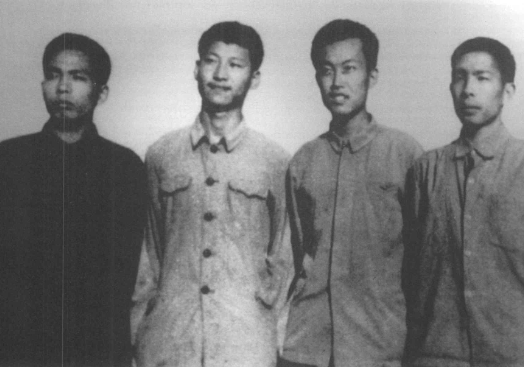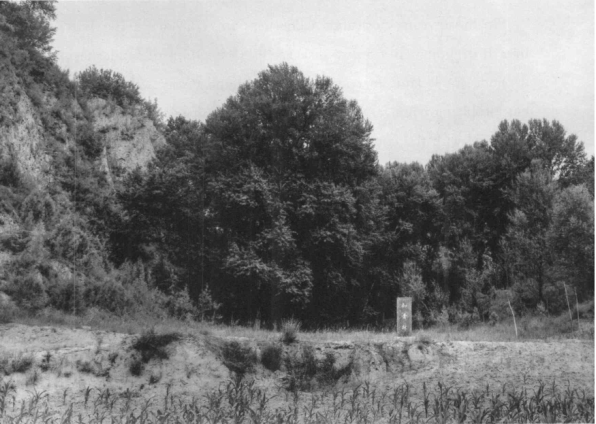From 1969 to 1975, Xi Jinping lived in Liangjiahe, a small village in China's Shaanxi Province as an "educated youth." In the village, Xi joined the Communist Party of China and was elected Party branch secretary. The following is an excerpt from LIANGJIAHE VILLAGE:A STORY OF CHINESE PRESIDENT XI JINPING, published by FOREIGN LANGUAGES PRESS in 2018.
In early spring 1973, the land in Northern Shaanxi was still frozen, when Xi Jinping was summoned and transferred to the County. Together with the Youth League secretary of Yanchuan County Tao Haisu, also an urban youth from Beijing, he had to conduct some work on socialist education in Zhaojiahe Village, at the Fengjiaping People's Commune.

A group picture of Xi Jinping(second left),Lei Pingsheng(first left),Tao Haisu(second right) ,and Lei Rongsheng(first right),urban youth all from Beijing
"After Xi arrived, Zhaojiahe changed completely." Regarding those unforgettable months of Xi's work on socialist education, the memories are still fresh in the minds of the people of Zhaojiahe.
The first change was the meetings.
Before Xi's arrival, Zhaojiahe had already been conducting work on socialist education. Yet, no one seemed to be interested in it. The speaker would do what amounted to a monologue. Onstage was the public address of the speaker, while offstage was the private chit-chatting of the attendees, and some women used to keep busy with needlework. But when Xi conducted the meetings, people would be punctual and orderly.
Wang Renhou, the village's king of witticisms, commented, "When Jinping spoke, everyone would be 'dumb-struck."'
Xi knew and understood people. He spoke their minds. His words were vivid and interesting. His socialist education incorporated folklore, history, and humanities. There was little cultural entertainment in the village at that time, so they enjoyed his stories. When telling them the story of the movie Three Laughs, at the moment of the punch-line, he'd say, "Now what happened next? Well, you'll know in the next episode." They all became so lost in his stories, some would forget the burning cigarettes between their fingers until their hands got singed!
The greatest controversy at that time concerned what was to be done with Shenchegou Valley. Some supported damming and terracing the valley to expand arable land and increase crop yields; while others worried that floods would wash away the dams and all their hard work. No side was able to persuade the other. In addition, the ground was frozen solid, unyielding to a spade or pickax at the time. Dynamite would have to be detonated and then the broken soil carted away. All of the work would be grueling, so many were not looking forward to it.
To Xi, the proposed project promised great potential for the village; and the work had to proceed immediately despite the frozen ground, as the seasonal agricultural cycle awaited no one. He convened a meeting and listened to everyone's ideas first. At the end, unerringly determined, he declared: "Let's do it!"
"When there is food in the cauldron, there will be food in the bowl. When there is none in the cauldron, there won't be any in the bowl either." His words sank into the villagers' hearts. Those were risky words in the political milieu of that time. But he was a person who spoke what he thought and did what he said. Construction work for the project commenced the following day.
Soon after the work began, Xi found that everyone had to go home for lunch around noon, and then would make another trip back to the worksite. A real waste of time and energy! After consulting with the villagers, he decided that a cooking team would be assigned to bring lunch up the hill to everyone every day. The new arrangement saved time and energy, afforded more break time, and enhanced efficiency.
Every morning at around 6:00 or 7:00, Xi would start work with the villagers, work that continued until nightfall. The villagers said, "Although Jinping is a kid from the city, he's tough and down-to-earth."
Within three months, the dams were completed. High-yield land in Zhaojiahe expanded by more than eight acres. In that same year, the village sowed corn in the newly reclaimed plots of land.
The reconstruction of Shenchegou Valley received broad accolades. The following spring, Tao Haisu, the Youth League secretary of Yanchuan County, organized all the Youth League secretaries of the communes in the county to visit and learn from Zhaojiahe. When they came, they each brought a bundle of poplar seedlings bought by the County Youth League. The poplar tree had been lauded by Mao Dun1 (Mao Dun (1896-1981), a noted writer in China, in whose name the most prestigious literary award is presented biannually. - Tr.)as the "great giant" among all trees, in his Ode to the Poplar. At the end of their trip, the visitors planted their poplar seedlings in the Mahuagou Valley near the edge of the village.
Forty years have now passed and the trees have truly grown into "giants" of great stature. The village named them, "Woods of the Urban Youth."
After he came to Zhaojiahe, Xi broached and resolved a "public case."There was a villager in Zhaojiahe named Wu Gangwen, or Suiwa as his childhood name. He was the most capable and shrewd in the village, the best at so many things including working the fields or herding sheep. The flock of sheep he herded never damaged any crops. Suiwa knew how to plan and strategize, and how to get everyone together. He had used to be the head of the production team, and everyone admired him.

Woods of the Urban Youth
However, a person of such caliber herding sheep was like, "a cannon used to kill flies." Quickly, Xi got to learn the story behind Suiwa's removal from his former position.
In the spring of 1965, the then Party secretary of the County, along with two other officials, had bicycled over the hills and come to inspect work at Zhaojiahe Village. Seeing Suiwa leading the villagers to reclaim wilderness, the leader angrily threw down his bike by roadside and demanded sharply: "Who is the head of this production team? Dating to practice capitalism by reclaiming wilderness?"
In those years, cultivating wilderness was considered a serious breach of policy. But Suiwa disagreed: "Cultivation of wilderness expands arable land, increases crop yields, and resolves the important problem of hunger. What is wrong with all that?" So he got into a quarrel with the county's Party secretary. He endured hard work despite fatigue, and now on top of that, he had to deal with a lot of nonsense; so, angry and frustrated, he decided to step down, permanently, from his position as the production team's head.
After Suiwa's resignation, the crop yields of the village dropped to new lows and stayed that way for years.
When Xi came to Zhaojiahe, Suiwa was 27 years old. Believing that Suiwa needed to return to his former position for the sake of the village's crop productivity, he went to talk with Suiwa.
"Suiwa, you have to come back."
"No. I had enough."
"You have to go back to that position. The village's crop yields depend on you."
Xi asked him to give more consideration to the community and its people. But, content with his current situation, Suiwa did not want to deal again with all the nonsense and hassles of the position. He gave a flat no to Xi.
Once, twice, thrice... After ten talks with Suiwa, Xi finally turned him around. The villagers said, "Xi's ferocious fire... Only his fire could fully cook loose the 'sinewy knot'2 ("Sinewy knot": "a stubborn person" in local dialect.)of Suiwa."
Xi also opened a night school at Zhaojiahe, for teaching the villagers how to read and write. It was in this school, Gao Xiaomei learned how to write her own name.
Gao was quick with her hands, able to match a male farmer in the fields. During the spring transportation of manure, males would make seven trips with their shoulder carriers, as did she. Xi commended her as "Iron Girl." This "Iron Girl" still remembered some recurrent slogans of Xi: "The speed of a train comes from its engine"; "To forge iron, the blacksmith must be strong."
Xi stayed in Zhaojiahe for eight months, where some said his talents were put on initial display. Others said Xi's work at Zhaojiahe simply was a prelude to what he would do to give back to this land and its people.
After the conclusion of socialist education at Zhaojiahe, the Party secretary of Fengjiaping People's Commune, Zhao Tingbi, wanted Xi to stay. After learning of this, the Party secretary of Wen'anyi People's Commune, Bai Guangxing, said, "What are they thinking? Do they expect us to fork over our talent to them?!"

